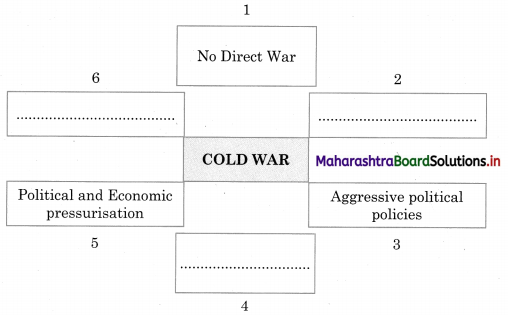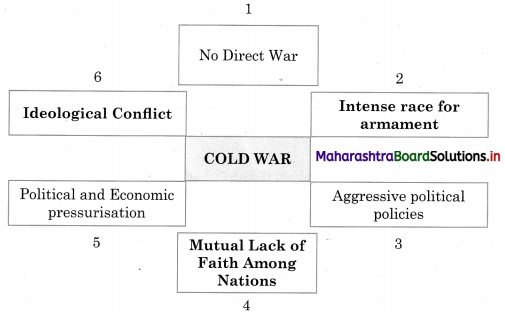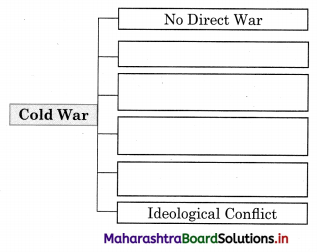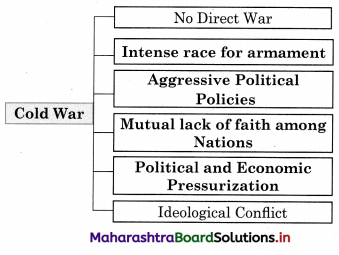Balbharti Maharashtra State Board Class 12 History Important Questions Chapter 10 Cold War Important Questions and Answers.
Maharashtra State Board 12th History Important Questions Chapter 10 Cold War
1A. Choose the correct alternative and rewrite the statement.
Question 1.
Walter Lippman was the first to use the term __________
(a) Hot War
(b) Warm War
(c) Cold War
(d) World War
Answer:
(c) Cold War
Question 2.
The term __________ was used by Sir Winston Churchill, the prime minister of England for the divisive line between Eastern European nations and Western European nations.
(a) Steel Curtain
(b) Copper Curtain
(c) Bronze Curtain
(d) Iron Curtain
Answer:
(d) Iron Curtain
![]()
Question 3.
After the Second World War was over, America had a __________ plan for the post-war reconstruction of Europe.
(a) Marshall
(b) Eisenhower
(c) Washington
(d) Nixon
Answer:
(a) Marshall
Question 4.
In 1961, __________ built the ‘Berlin Wall’.
(a) Germany
(b) Soviet Russia
(c) America
(d) Great Britain
Answer:
(b) Soviet Russia
Question 5.
__________ means Restructuring.
(a) Glasnost
(b) Duma
(c) Perestroika
(d) Glavlit
Answer:
(c) Perestroika
Question 6.
The __________ Conference inl973 was an attempt to end the Vietnam War.
(a) Moscow
(b) Bonn
(c) Berlin
(d) Paris
Answer:
(d) Paris
![]()
Question 7.
The ‘three-way defence pact’ treaty in the Pacific region is known as __________
(a) ANZUS Treaty
(b) NATO Treaty
(c) SEATO Treaty
(d) CENTO Treaty
Answer:
(a) ANZUS Treaty
Question 8.
SAARC was officially established at __________
(a) New Delhi
(b) Dhaka
(c) Colombo
(d) Kathmandu
Answer:
(b) Dhaka
1B. Find the incorrect pair from group ‘B’ and write the corrected one.
Question 1.
| Group ‘A’ | Group ‘B’ |
| (a) NATO | London |
| (b) SEATO | Thailand |
| (c) CENTO | Turkey |
| (d) SAARC | Dhaka |
Answer:
NATO – Paris
Question 2.
| Group ‘A’ | Group ‘B’ |
| (a) Sir Winston Churchill | France |
| (b) Premier Stalin | Russia |
| (c) Mr. Eisenhower | America |
| (d) Ayatollah Khomeini | Iran |
Answer:
Sir Winston Churchill – England
2A. Write the names of historical places/persons/events.
Question 1.
The wall was built by Soviet Russia in 1961 –
Answer:
Berlin Wall
Question 2.
Venue of the conference held in 1978 to resolve the strife between Israel and Arabs –
Answer:
Camp David
![]()
Question 3.
The meaning of ‘Openness’ in Russian means –
Answer:
Glasnost
Question 4.
Perestroika means –
Answer:
Restructuring
Question 5.
Capital of Germany –
Answer:
Berlin
Question 6.
The Germans called the ‘Berlin Wall’ –
Answer:
‘Wall of Shame’
Question 7.
The ‘Southeast Asia Collective Defence Treaty is also known as –
Answer:
Manila Pact
Question 8.
The full form of SAARC is –
Answer:
South Asian Association for Regional Co-operation.
2B. Choose the correct reason from those given below and complete the sentence.
Question 1.
The Western European nations under the influence of America adopted __________
(a) capitalist ideology and dictatorship
(b) capitalist ideology and democratic system
(c) communist ideology and democratic system
(d) communist ideology and dictatorship
Answer:
(b) capitalist ideology and democratic system
![]()
Question 2.
Europe was divided after the Second World War on the basis of __________
(a) only military concerns
(b) only political concerns
(c) political, economic, and military concerns
(d) only economic concerns
Answer:
(c) political, economic, and military concerns
3B. Complete the following concept map.
Question 1.

Answer:

Question 2.

Answer:

4A. Write short notes.
Question 1.
ANZUS Treaty.
Answer:
- The word ‘ANZUS’ stands for Australia(A), New Zealand (NZ), and the United States of America (US).
- These nations signed a treaty on 1st September 1951. This treaty was signed for their collective security and therefore is commonly known as ANZUS Treaty.
- These nations are in the Pacific region.
- Hence, this treaty is also described as a ‘three-way defense pact’.
- This was the first of its kind.
- This treaty had one more objective to protect the countries in the Pacific Ocean from communist China.
Question 2.
Criteria of Non-Aligned Movement.
Answer:
- Criteria for Non-Alignment (Adopted at Belgrade, 1961)
- The country should have adopted an independent policy based on the co-existence of states with different political and social systems.
- Support national independence movements.
- It should not be a member of a multi-lateral alliance concluded in the context of the Cold War.
- It should not be a member of a bilateral military alliance or a regional defense pact in the context of great power conflicts.
- It should not concede military bases to foreign powers in the context of great power rivalry.
![]()
Question 3.
Challenges before SAARC.
Answer:
SAARC is laden with many difficult issues to tackle such as
- The economic disparity among the member nations.
- Expenditure allotment for defense.
- Inadequate infrastructure.
- Underdevelopment of agricultural sector.
- Rising terrorism.
- Population explosion.
- Insufficient trade.
- Divergent political systems.
- Religious-lingual diversity etc.
5. State your opinion.
Question 1.
The Warsaw Pact was signed.
Answer:
- To oppose American policies and to strengthen communist nations, Soviet Russia brought together seven communist countries in eastern and central Europe known as ‘Eastern Bloc’ and signed a treaty commonly known as Warsaw Pact.
- Along with Soviet Russia, Albania, Bulgaria, Czechoslovakia, East Germany, Hungary, Poland, and Romania signed this treaty.
- Albania withdrew from it in 1968.
6. Answer the following questions in detail.
Question 1.
Write a note on the aftermath of the ‘Cold War’.
Answer:
- During the period of the Cold War there were many factors that threatened the very future of mankind.
- These included political misunderstandings among nations, world’s nations splitting into two distinct groups, priorities to secret political moves and treaties, absence of priority to the process of disarmament, use of science for producing destructive weapons, neglect of basic and important issues like food, clothing, and housing, etc.
- Both the USA and Soviet Russia had to pay very heavily for their strategy of letting the situation of the Cold War prevail over a prolonged period.
- The consequence of the dissolution of Soviet Russia left the USA as the only superpower in the world.
![]()
Question 2.
Discuss Mikhail Gorbachev’s era.
Answer:
- Mikhail Gorbachev became the General Secretary of the Communist Party of Soviet Russia and the Premier of Soviet Russia in 1985.
- His period saw the end of the Cold War.
- He introduced important reforms in Soviet Russia through his policies known as ‘Perestroika’ (Restructuring) and Glasnost (Openness).
- During his time the economy had grown weaker.
- Gorbachev tried to normalize it by restructuring the political and economic systems of Soviet Russia.
- He attempted to democratize the political system by way of open elections and to end the authoritarian rule of the communist party.
- He decentralized the economic machinery of the state.
- Authors, journalists, and intellectuals were given more freedom of expression.
- However, Gorbachev could not stop the integration of his own country.
- Soviet Russia disintegrated during his period.
7. Answer the following question with the help of the given points.
Question 1.
(a) NATO
(b) ANZUS
(c) SEATO
(d) Warsaw Pact
Answer:
(a) NATO was an alliance created to protect 29 of the European countries from the expansionist policy of Soviet Russia. Its members included Norway, France, Italy, Denmark, Great Britain, America, Netherland, Portugal, Turkey, West Germany, Greece, Belgium, Canada, Iceland, Luxembourg, and Spain.
A few of the important terms included in the NATO alliance are as follows:
- An attack on any of the member countries of the alliance would be treated as an attack on all member countries; all of the member countries will try to maintain peace and security; any of the mutual issues among the member countries shall be resolved through discussions.
- The headquarters of NATO are in Paris.
- America had a significant influence in the decision-making process of NATO. To counter America’s influential position in NATO, Soviet Russia brought together the communist countries in Europe and a treaty commonly known as the ‘Warsaw Pact’.
(b) ANZUS Treaty:
- The word ‘ANZUS’ stands for Australia(A), New Zealand (NZ), and the United States of America(US).
- These nations signed a treaty on 1st September 1951. This treaty was signed for their collective security and therefore is commonly known as ANZUS Treaty.
- These nations are in the Pacific region.
- Hence, this treaty is also described as a ‘three-way defense pact’.
- This was the first of its kind.
- This treaty had one more objective to protect the countries in the Pacific Ocean from communist China.
(c) SEATO:
- (Southeast Asia Treaty Organisation) England, America, France, Australia, New Zealand, Pakistan, Thailand, and the Philippines came together and signed a treaty on 8th September 1954 in Manila (Philippines) to ensure the collective defense of the countries in South East Asia. This treaty is also known as the Southeast Asia Collective Defence Treaty or Manila Pact.
- The pact was mainly intended to stop the spread of communism in South East Asia. It was decided that if any of the nations included in the pact was attacked then other nations signing the pact would collectively stand up against it and in times of peace, they would extend help for the social and the economic development of each other. However, this treaty had a number of flaws. Although it was named as the treaty of the South East Asian countries, only three countries from Asia namely Thailand, the Philippines, and Pakistan were included in it. The western power did not have any deep understanding of the problems of the Asian countries.
- The headquarters of SEATO was located in Thailand. In 1973, Pakistan withdrew from it. In 1975 France stopped providing monetary help to this organization.
- On 30th June 1977, this Organisation was officially dissolved.
![]()
(d) Warsaw Pact:
- To oppose American policies and to strengthen communist nations, Soviet Russia brought together seven communist countries in eastern and central Europe known as ‘Eastern Bloc’ and signed a treaty commonly known as Warsaw Pact.
- Along with Soviet Russia, Albania, Bulgaria, Czechoslovakia, East Germany, Hungary, Poland, and Romania signed this treaty.
- Albania withdrew from it in 1968.